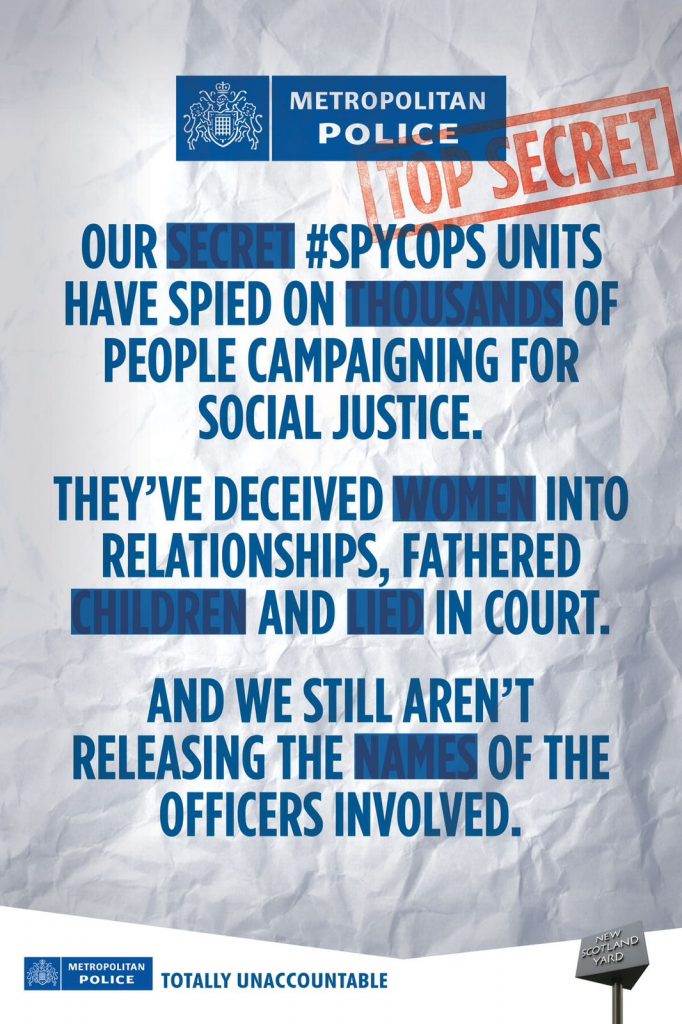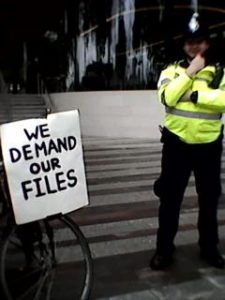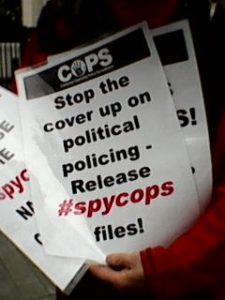
“How many more women may have been affected by these abuses? How many more children may have been fathered by these undercover officers? It is clear the police are not going to come clean. The only way there can be real justice is if the Inquiry releases the cover names and opens the files so that these women can come forward themselves.” Kate Wilson
Since 1968, top-secret political police units have been operating in Britain, spying on all forms of protest and political dissent. Other women, going about their private business and having not connection with politics or crime, have also come into contact with undercover police officers (UCOs) who have deceived them into long term, intimate, sexual relationships – including fathering children. Thousands of people have had their lives infiltrated and their privacy and human rights violated. Now, the secret is out, and we should all have open and uncensored access to the information they held on us. But the years of shocking revelations and court battles show that that is never going to happen unless we join together to put up a fight.
 We demand that the Inquiry releases the cover names of all the officers that infiltrated social justice groups, and that it releases the files held on the women violated, so we can understand the truth of what happened to us. All state bodies holding private information on women affected should disclose these documents, this includes the Crown Prosecution Service, the Home Office. The chair of the Public Inquiry into Undercover Policing, Sir John Mitting has given anonymity to approximately two thirds of the officers who requested it which means there are far too many officers whose fake identity we know nothing about. This is not justice.
We demand that the Inquiry releases the cover names of all the officers that infiltrated social justice groups, and that it releases the files held on the women violated, so we can understand the truth of what happened to us. All state bodies holding private information on women affected should disclose these documents, this includes the Crown Prosecution Service, the Home Office. The chair of the Public Inquiry into Undercover Policing, Sir John Mitting has given anonymity to approximately two thirds of the officers who requested it which means there are far too many officers whose fake identity we know nothing about. This is not justice.
In 1991 the Wall had already fallen in Berlin, but the Stasi, the East German Secret Police continued to operate. Protesters were on hunger strike asking to see their Stasi files, but the interim government was still debating what should be done with the massive secret police apparatus. Maybe they were planning to cover it all up and keep going. Maybe they wanted to hold a public inquiry. But on 14th January the people of Berlin saw smoke rising from the massive complex of Stasi head offices, as the police frantically burned files in an attempt to destroy the evidence of decades of abuse. The next day citizens of Berlin stormed the Stasi complex to stop the destruction. On 1st January 1992 the Stasi Document Law came into effect in Germany and since then more than 7 million people have applied to see their files.
Meanwhile, in London:
“A team of undercover police officers had spent the evening drinking and chatting in a London apartment… They turned on the television to catch a news report from Germany. Tens of thousands of Germans were trawling through secret files compiled on them before the Berlin Wall came down. There was a wave of revulsion at the scale of surveillance perpetrated by the Stasi, the East German secret police… The TV report showed the distraught face of a woman in Berlin who had discovered that the man she had loved for years was a spy. There was silence in the lounge. Then one of the undercover police officers said what the others must have been thinking. ‘You do realise, this is going to happen to us one day,’ he said…” Rob Evans and Paul Lewis, Undercover: The true story of Britain’s Secret Police (2013)
 In the end, it was not until 2010 that information began to come to light about the activities of Britain’s Secret Political Police; since then further undercover policing abuses have emerged in the Metropolitan Police and other constabularies. They kept thousands and thousands and thousands of files.
In the end, it was not until 2010 that information began to come to light about the activities of Britain’s Secret Political Police; since then further undercover policing abuses have emerged in the Metropolitan Police and other constabularies. They kept thousands and thousands and thousands of files.
Each new revelation about the abuses committed by British secret police units has caused great public outcry. But despite years of ongoing court battles and a public inquiry called by the ex-Prime Minister and then Home Secretary, Theresa May, into the damage done by undercover policing, none of the people affected by these abuses has yet been given access to the truth.
Everything we know about these officers comes from activists, researchers, whistleblowers and journalists. The information we have covers less than 10% of the officers deployed. The Undercover Policing Inquiry (UCPI) has been under way since 2016, but it looks more and more like it is going to be a whitewash. At best, it seems likely it will drag on for years and years, as the police obstruct the process with endless and disturbing applications for secrecy. Meanwhile the smoke is rising from the truckloads of files we know (from legal battles and the brave efforts of whistleblowers attempting to stop the cover-up) that the police have already destroyed.
Since the first legal cases were first launched in 2011, the police have shown that they will do anything to keep the truth about their operations from the public. They protect themselves not the public. People have a right to know what was done to them and what files are held on them. The Public Inquiry must release the cover names of all the officers who were spying on political movements, release the names of all the groups that were spied on and give us open and uncensored access to our files.
Get involved

